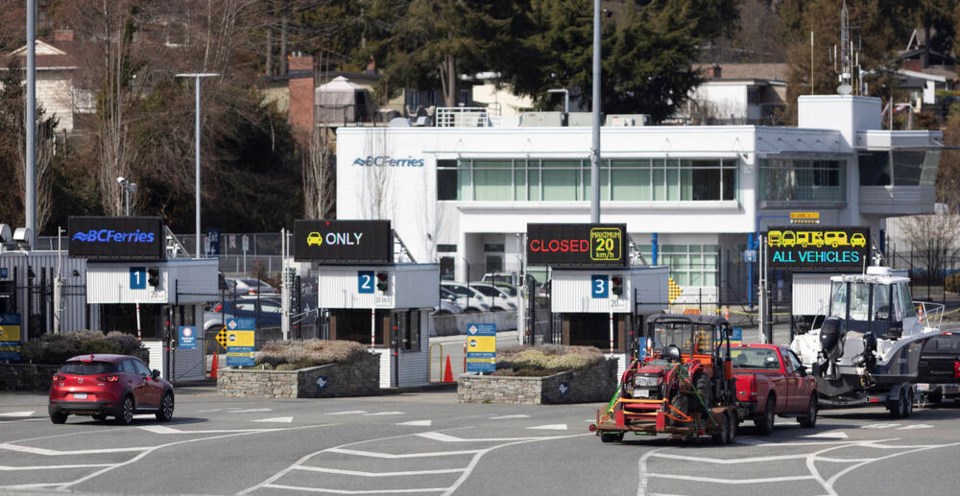Four days past the 20th anniversary of the liberation of sa¹ú¼Ê´«Ã½ Ferries from the clutches of politicians, maybe it’s time to acknowledge the sea change that is underway.
In the wake of the NDP government’s latest rescue mission at sa¹ú¼Ê´«Ã½ Ferries, something is becoming clear.
The model, devised in 2003 by the previous sa¹ú¼Ê´«Ã½ Liberal government to run the system independent of government, is a charade now. The world has changed and it won’t be changing back anytime soon. Maybe it’s time to accept reality and fold sa¹ú¼Ê´«Ã½ Ferries back into government as a Crown corporation.
The age-old advice to “follow the money” applies. Specifically, the $500-million bail-out that was carved out of the provincial surplus and handed over to the ferry corporation. It is in order to avoid a political crisis. The calculations are that the system needs nine per cent annual fare hikes for four years to keep sailing. The $500 million is to hold them to three per cent instead.
It was welcome news, but what got overlooked was how huge that amount is. The sum is 2½ times the current annual operating grant that sa¹ú¼Ê´«Ã½ provides the corporation. It demonstrates the degree of generosity from the government. But it also illustrates how profoundly out-of-whack the ferry system is.
Particularly since it’s the third major extra payment in four years. There was a $100-million injection in 2019, partially funded by the government and scrounged from sa¹ú¼Ê´«Ã½ Ferries net earnings, to reverse previous cuts. There was a federal-provincial emergency grant of $308 million at the height of the pandemic, when ridership collapsed and sa¹ú¼Ê´«Ã½ Ferries was losing $1 million a day.
There may have been an impression that the system was saved from the pandemic catastrophe and can now return to normal. The additional $500 million and the independent commissioner’s ominous assessment last week of the system shows there is no more normal.
It’s supposed to be used over four years. There’s nothing to suggest more won’t be needed after that to avoid huge make-up fare hikes.
This isn’t going according to the Liberals’ 2003 plan. The idea then, fresh off the NDP’s fast-ferry debacle, was to divorce the Crown corporation from government as much as possible. sa¹ú¼Ê´«Ã½ still owns the corporation, but cut-outs were installed to make it as independent as possible from politicians.
A corporate entity was added on top of the sa¹ú¼Ê´«Ã½ Ferries board of directors and a commissioner was installed for vigilant independent oversight. “sa¹ú¼Ê´«Ã½ Ferries” was stripped from the government’s books as a reporting entity, along with the accumulated debt.
A hard-charging CEO (David Hahn) was hired and he imposed big fare hikes, started a major ship building program (using cheaper European shipyards) and generally ran the system with an eye on the bottom line.
sa¹ú¼Ê´«Ã½ Ferries operated under a contract where the government supplied a nine-figure sum to subsidize the fleet, then the politicians backed off and had nothing more to do with it. (The subsidy was originally $106 million a year and has risen to $194 million.)
But when corporate decisions became too unpopular, Liberal cabinet ministers started meddling several years in. After the NDP took over in 2017, the independence eroded further. Under the contract, they couldn’t order the changes they wanted, so they bought them instead.
The $100 million was produced in 2019 to restore free mid-week seniors’ travel, roll back fares 15 per cent on smaller routes and freeze fares on the major routes for a time.
More recently, a bill to sideline the board of directors and give the NDP appointees on the ferry authority superboard more power was introduced.
That was abandoned and, instead, former NDP cabinet minister Joy MacPhail was named chair of the sa¹ú¼Ê´«Ã½ Ferries board. She later MCed David Eby’s swearing-in ceremony, which signals she’ll be around for at least as long as he is.
She ousted Mark Collins as CEO last summer and installed former ICBC head Nicolas Jiminez last month.
The pandemic changes and chronic crew shortages eliminate any chance of cost-cutting. sa¹ú¼Ê´«Ã½ Ferries needs more of everything. The bailout pattern weakens the resolve to cut costs even if they could.
sa¹ú¼Ê´«Ã½ Ferries is entirely in the hands of the NDP government now, at a time when restoring dependability is more important than arguing about control. They might as well make it official.


